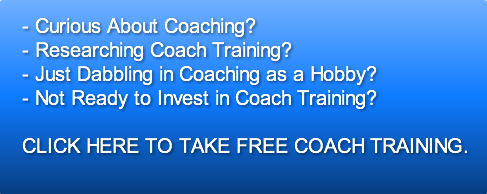If you think you understand trends in business and life coaching, you're probably dead wrong.
life coaching, you're probably dead wrong.
Why? Because the future of humanity is about to change at even more breathtaking rates. That means the future of coaching is not what you think. Not even close.
How's that? We're about to reach a technological 'tipping point' across several technologies and this runaway world we live in is about get a million times faster.
You've heard of Moore's Law? It's the well-established prediction that computing power will double every 18 months, while prices plummit. In other words, exponential growth. Moore's Law has held true for decades. The current result is an iPhone processor that's more powerful than the 1970's Apollo rockets that travelled to the Moon. (which makes Apple's recent map app blunder seem especially silly)
If you were to graph exponential growth, you'd get what's known as a 'hockey stick' curve. At first you get a relatively long period of slow growth, with a slight incline, but at some point the numbers that are doubling become so huge that the curve goes virtually vertical. That's the tipping point or 'escape velocity' that we've just about reached with computing power.
Moore's Law is what futurists call a hard trend. It's a prediction that you can count on. Some futurists say that Moore's Law can be applied to other technologies as well, such as nanotech and artificial intelligence, and that when you combine these technologies, as they are doing at Singularity University, you get even more explosive growth and more escape velocity.
What does all this tech mean to coaches, other than the possibility that someday, Skype will stop bumping us off our free international video calls? Well if you consider Adizes' Change Constant (Change leads to problems, which lead to solutions, which lead to more change, etc.), our potential clients are about to have a lot more problems. They're mostly the kind of problems you want to have, as we say, but they still will feel like big problems to them. And that's when they hire coaches. But wait, before you cheer...
What kinds or problems are caused by explosive growth in the tech fields? Well first there are new jobs created, like IT professionals, website designers and virtual assistants; jobs most people couldn't conceive of 50 years ago. And then there is the elimination of jobs that are replaced by technology, like librarians, sign painters and secretaries. Painful! Except, every time technology replaces some jobs, it creates new ones, such as international tech support, robot repair, and home-based manufacturing. That's a cycle you can count on. New high-paid jobs are always on the horizon, only most people can't even conceive of them, much less get ready. That's scary.
Let's face it, our ancestors evolved back when exponential change equaled the invention of the wheel, the bow and arrow and roasted mastadon instead of raw. Those changes occured at the slow-sloping left side of the hockey stick curve and that's what your nervous system today is wired for, not change at the rate of a new job every year. Jeez.
People are going to need assistance in making constant life-changing transitions, the kinds our grandparents only made once or twice in a lifetime. Maybe we'll need more psychotherapists to talk us down off the ledge, but in this month's Wired magazine, Founding Editor, Kevin Kelly says robots will soon replace therapists. I don't know about that, but he also says nurses, teachers, personal trainers, waiters and surgeons will soon be robotic. The jobs will go to the people who manage the bots.
The best-paying jobs will go to those who can leverage the added value that technology is constantly creating. Beyond that, we can spend our time doing what we want.
So what's the one job Kevin Kelly says robots can't replace? The job of deciding what people really want to do.
Coaches help people decide what they really want to do.
Coaching is not a tech job, but technology creates the need for coaches. And it's creating more of that need all the time for coaches who are ready.
Can coaches be replaced by artificial intelligence? We're a long way from that, because coaching relies at least as much on 'right brain' intuitive skills, which have been a challenge to the computing field so far, as it does on linear processing skills. But they'll probably crack intuition, eventually.
However, no amount of AI will ever make robots human. You could program 3CPO to say, 'I believe in you', but those words ring hollow unless you hear them from someone whose opinion matters to you.
Coaching will likely be with us for several more decades, or at least until Siri gets programed to ask more than she tells.
What else is about to change? Everything from the demise of our current too-slow, too-expensive, too-ineffective system of higher education (watch this video of new Google University for what might be next); to the rise of the 'bottom billion' as a result of cheap smart phones that now connect impoverished people to unlimited information, to vertical farming that can scale up to feed 10 billion of us. To get a more complete picture, I highly recommend you read Abundance by venture capitalist and X Prize founder Peter Diamandis.
by venture capitalist and X Prize founder Peter Diamandis.
How can you get ready to coach in the coming decades?
Surprisingly, you don't need to chase every trend. And you don't need to coach huge numbers of people for less. Because the rise of technologies means there is also a trend at the other side of the spectrum. It's the one that leverages Kevin Kelly's 1000 True Fans concept and focuses on hyper-customization and hyper-personalization.
Chris Brogan calls this the 'bespoke business'. This is the type of business most successful coaches have. It includes just a few clients who each pay a hefty fee. It usually also includes some lower-priced options and free content in order to build relationships and true fans. This type of business is on the rise and looks like it's here to stay.
More people will need and want coaching in the coming future. Less expensive goods and services provided by automation will free up money. And with the coming need to prepare for new professions every year, the savvy will use that money to hire tutors, mentors and coaches to help them get where they need to go faster.
What's a good strategy for a coach moving forward into the super-high-tech world of the future? Become the best - perhaps the only - in your specialty. Get just the training you need, be nimble and ready to pivot when things change dramatically, have your own coach and take super great care of yourself - you'll need it.
And have fun. Technology is designed to free us from drudgery. Coaching is the perfect profession for enjoying that freedom.
Need some coach training?





 life coaching, you're probably dead wrong.
life coaching, you're probably dead wrong.


 Like millions of others, I've grown to love
Like millions of others, I've grown to love 
 Recently I interviewed
Recently I interviewed 




 A committed leader devoted to help steer the future direction of the coaching profession, Dr. Kristi Arndt is Vice President of the International Association of Coaching (IAC). Kristi integrates extensive knowledge of the Human Design System to guide her clients according to life strategies that are correct for them. A lifelong learner and agent of change, she has fifteen years of professional experience in secondary and higher education settings including roles as a university learning center director and faculty development coordinator at a veterinary school. Kristi is a Master Certified Coach with the IAC and a Board Certified Coach through the Center for Credentialing and Education who earned PhD, EdM, and DVM degrees from the University of Illinois at Urbana-Champaign. To get better acquainted, please book an appointment with her at
A committed leader devoted to help steer the future direction of the coaching profession, Dr. Kristi Arndt is Vice President of the International Association of Coaching (IAC). Kristi integrates extensive knowledge of the Human Design System to guide her clients according to life strategies that are correct for them. A lifelong learner and agent of change, she has fifteen years of professional experience in secondary and higher education settings including roles as a university learning center director and faculty development coordinator at a veterinary school. Kristi is a Master Certified Coach with the IAC and a Board Certified Coach through the Center for Credentialing and Education who earned PhD, EdM, and DVM degrees from the University of Illinois at Urbana-Champaign. To get better acquainted, please book an appointment with her at
 by
by 

